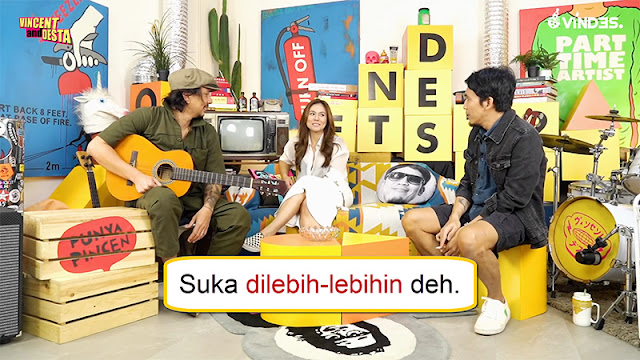- Get link
- X
- Other Apps
Posted by
Iman Prabawa
on
- Get link
- X
- Other Apps
Apa kabar semuanya? Ketemu lagi dengan saya, Iman Prabawa. In this article, I want to talk to you about the meaning of the phrase [dilebih-lebihin]. As usual, we will watch examples from movies, youtube videos, and whatnot where the phrase [dilebih-lebihin] is spoken.
If you have any questions regarding the Indonesian language, you can ask me directly. You can see how to do that on my About Me page.
If you are a beginner in the Indonesian language, you can learn step by step with My Lesson Here.
Without further ado, let's start. Shall we?
Meaning of Dilebih-lebihin In the Indonesian Language
When someone exaggerates something, you can say that something is [dilebih-lebihin]. Or when you are making something look bigger when in fact, it is not that big.
[Dilebih-lebihin] is the informal version of [dilebih-lebihkan]. Both mean the same. In a more casual way, there is also a term called [lebay], which also means the same as both [dilebih-lebihin] and [dilebih-lebihkan].
I have made an article where I discuss the meaning of [lebay], and in that article, there are a lot of example scenes from movies that you can see to better understand this. You can read it here, Meaning of Lebay In the Indonesian Language.
Examples of Dilebih-lebihin In Use
In this section, you will see examples from movies, youtube videos, and everything where the phrase [dilebih-lebihin[ is spoken.
The first example is from a talk show on Vindes' youtube channel. Let's watch the clip below.
Desta: Tapi, Wulan bener loe Lan, gue ngeliat loe emang ngga pernah.. kaya ngga pernah bertambah umur, gitu. (This is true. Whenever I look at you, you’re like, never grow old.)
Wulan: Masa sih? (Really?)
Desta: Gue jaman.. Kita ngefans dari awal di Pondok Indah ya? (When I was.. We've been her fans since the beginning of Pondok Indah, right?)
Vincent: Iya, ya, ya. (Yes, yes, yes.)
Desta: Tuh kan! Suka dilebih-lebihin deh. (Oh, come on. You like to exaggerate things.)
Desta: Ngga dilebih-lebihin. Ya orang kenyataan. (No, I'm not exaggerating. This is a fact.)
Vincent: Pertama kali ketemu.. (The first time we met..)
Wulan: Alhamdulillah. (Praise be to God.)
In this scene, you see that the phrase [dilebih-lebihin] collocates with the word [suka]. They usually go together, [suka dilebih-lebihin].
Vocabulary From the Scene
[Bener loe (someone's name)] <--- this phrase is usually used when you want to emphasize something that you are going to say is true and that you are not making this up.
[Ngelihat] is the colloquial way of saying [melihat] = to look at something.
[Loe] is informal for [Anda]. You can read my article, Loe Meaning In Bahasa, for more about this.
[Umur] = age.
[Bertambah] = increase.
[Orang] in this sentence [ya orang kenyataan] doesn't mean a person. [Orang] in this sentence is used to emphasize the word after it, [kenyataan]. You can say it in other words, [ya orang kenyataan] = [ya kan kenyataan].
[Ngga] is the informal way of saying [tidak] = no.
Read also: PHK Meaning In Bahasa
I guess this wraps up this article. If I find another example, Insha Allah, I will update this article again. If you have any questions, just leave them in the comment section below, or you can send me DM through my Instagram, and I'll be happy to answer them for you.
Thank you for reading my article, and I'll talk to you soon. Bye now.
- Get link
- X
- Other Apps
Hello, I'm Iman Prabawa a.k.a Pak Guru Iman. I love to share about languages. My Instagram, @iman_prabawa

Comments
Post a Comment